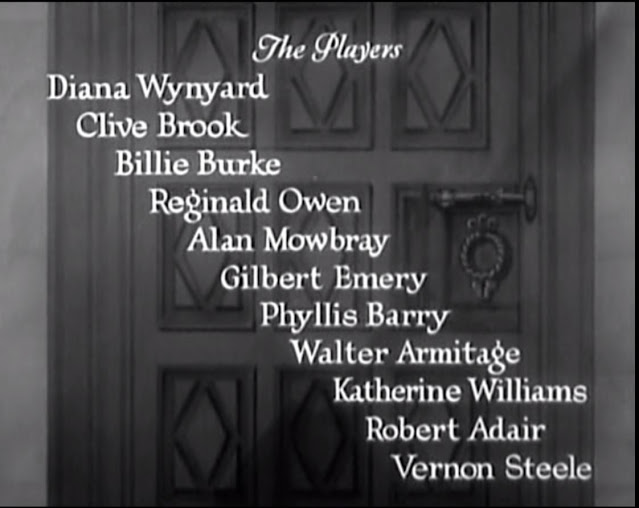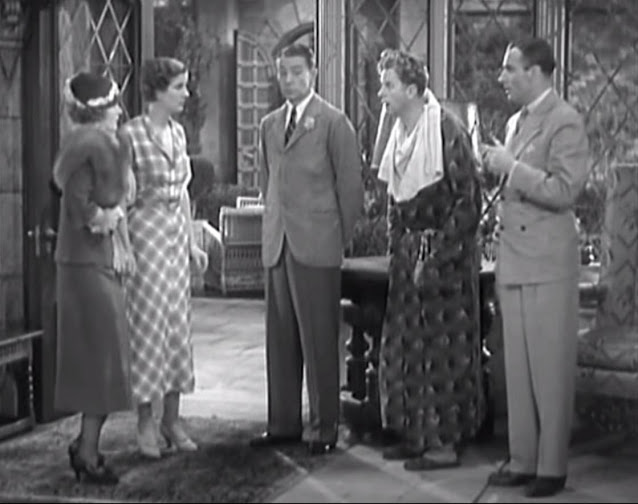Glinda the Good Witch, Winnie the Pooh, and Dracula's Daughter -- Garbo
This pre-pandemic review, below, from The Guardian shows that "The Dover Road" is still a popular small-venue stage offering.
First, the title. The house in which I'm writing this post is within driving distance of Dover, New Hampshire. "Our" Dover of course is named for the English seaside town of Dover in Kent, England. Unless you're an Angophile, you may be more familiar with other seaside towns, like Blackpool to the west or Brighton in southern England. The former has had a long tradition of boardwalks and bathing-machines beach town, while Brighton has been filled with both carnival rides and dive bars -- it's where the Mods and the Rockers have their confrontation in the Who film "Quadrophenia."
"The Dover Road" was on Broadway starting in 1921. The first movie version was a silent film, titled "The Little Adventuress," and it appeared in theaters in 1927.
The actress Vera Reynolds is no one I ever heard of but obviously was a bigger name in the late 1920s. The best-documented of her films include "The Monster Walks" and "Prodigal Daughters." At the end of this post, there's a link to a photo gallery featuring Reynolds.
The work of "The Little Adventuress" adapting Milne's play for the silent screen was done by Clara Beranger, who worked at the Famous Players - Lasky film studio, which would become Paramount Pictures. During her Hollywood career, Beranger wrote scripts for eighty silent films and a few soundies as well. In 1928, she married the director of "The Little Adventuress," William C. DeMille, who was Cecil B. DeMille's older brother and the father of dancer Agnes deMille.
In 1934, seven years after the silent film "The Little Adventuess," Milne's play once again became a movie, this time an RKO comedy with the title "Where Sinners Meet." This was pre-Code Hollywood, and the poster promised more salaciousness than is actually in the film. Some ticket purchasers may have been disappointed.
The movie poster hints of scandal and excitement, but "Where Sinners Meet" is more of a morality play or a comedy of manners -- a bit like a Shakespearean comedy, with a touch of Oscar Wilde added to it, perhaps something along dailogue from "The Importance of Being Earnest."
This movie was very different than "The Little Adventuress." Movies with sound were the norm by 1934, and RKO was a well-established studio by the time it brought audiences "Where Sinners Meet."
When an English lord and his mistress, posing as man and wife, appear at a mansion which also serves as a "sort-of" hotel, they are greeted by a rather stoic and commanding butler.
The pair are startled when the butler locks the front door behind them and clips the large key to his waistcoat.
The couple then meet their host, Mr. Latimer.
Even worse, it turns out that, in addition to the lord and his paramour, there is another couple, who've also been locked into the "hotel," also pretending to be married. Astoundingly, they are in fact the lord's actual legal wife and the boyfriend of the "wife" of the runaway lord, and they have also away, as a couple, from their own relationships by taking the Dover Road.
The lord's wife is surprised to find her escapee husband with uncombed hair, half-shaved and covered in shaving lather, wearing a borrowed bathrobe, at mid-day. He also has a head cold and is unattractively sneezy and sniffly. He's a mess.
Meanwhile, the lord's pretend-wife has a heart-to-heart moment with her former flame, and it's obvious now to both that she never was really in love with him..
Confounded by the whole mess, both male guests beg Mr. Latimer to let them escape from the women.
But Latimer's starting to discover a connection with one of his women.
I won't spoil the ending but you may not need me to do that because the movie poster shows Clive Brook, who plays the host Mr. Latimer, as the male romantic lead.
Two cast members really make "Where Sinners Meet" at lot of fun to watch. One is Billie Burke, who in real lfie was married to showman Florenz Ziegfeld. Twelve years after "Where Sinners Meet," Burke would make her mark as Glinda in "The Wizard of Oz."
Burke was famous for her highly-recognizable voice, which was high-pitched and fast, with a comedic nervous-bird quality. But she was capable of dramatic acting, as in play-turned-film "A Bill of Divorcement" (1932).
Burke's character in "Where Sinners Meet" is one of her quirky, silly-voice women. As Eustacia, she talks to her new flame using baby talk, always referring to herself in the third person.
When her husband-to-be gently objects to being treated like a little boy by his nanny-wife, Eustacia is startled by his lack of appreciation.
And then, hanky to nose and lips, Eustacia collapses face-first into the divan cushion until her boyfriend apologizes and rubs her back. Burke, as Eustacia, is somewhat endearing but none of us would want to be married to her.
The movie's other cast stand-out is Gilbert Emery, who plays Dominic the butler.
Dominic, the head butler, is both a stern commandant for servers who march in precision order to the dining room and then put courses on each meal on the table in military form.
In addition to a man who rules the staff with a rod of iron, Dominic (as played by Emery)- also a Jeeves-like character who suffers fools ungladly, pu to a point, because that's his role in life. Like Jeeves, Dominic will only put up with so much. In a scene near the end of the film, when Latimer and the other two men prevail upon the butler to feign illness in order to attract the attention of the over-motherly Eustacia, Dominic refuses firmly, his lips puleed tight in suffering dignity.
The cast and plot in "The Dover Road" are both good all around, but the film's chief charm may be the "Upstairs, Downstairs" / Downton Abbey" aspect, in which we see the lives of the wealthy and the lives of the middle and servant classes in action. The fact that the play's still popular in community theatre affirms the solidness of this story and its characters.
The marital connections in "The Dover Road" are comic but complex, and the real-life marriage of A. A. Milne and his wife Dorothy "Daphne" de Sélincourt was also complex. Both Milne and his wife had their own paramours, and I'm sorry to report that the pressure of being Britain's most lovable family had the result on Christopher Robin's relationship with his parents that we see in Hollywood families today.
But let's ignore all that, shall we? After all, movies are a magic way to sidestep the unpleasantnesses of grim reality. Let us go back before the family roles got messy, back before the Chunnel (the tunnel built under the English Channel) let people go casually from London to Paris and back again. Let's remember that there was once a time when people sang about the romance of "Walking Down the Dover Road," the lovers' road.





































Comments
Post a Comment